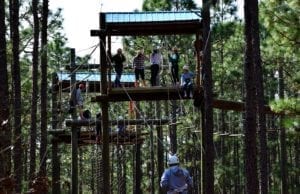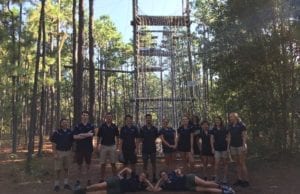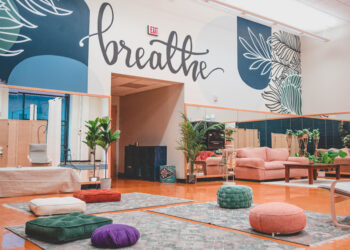Team building exercises are an excellent way to encourage learning opportunities and help groups develop effective skills. While most of these exercises are pre-designed, the Challenge Course at the University of North Carolina Wilmington (UNCW) provides a unique team building experience by offering specifically catered programs.
The Challenge Course has two primary types of courses: low ropes and high ropes.

“Different programs can be created by combining or changing elements within these types of programs,” said Thomas Bartolotta, the assistant director of adventure recreation at UNCW. “Each one is designed to fit the goals or expectations the group leader defines prior to the event with either their lead facilitator or the challenge course coordinator – this way these specific aspects can be worked into the group discussions and related back to the personal experiences of their everyday lives.”
Bartolotta has found many groups are able to bond and discuss challenges easier when they relate a topic to the game or activity they just finished. “Our facilitators are trained to help aid in the direction of these conversations and not use it as a platform to ‘teach,’” he said. By doing this, they put the power in the hands of the team, furthering the bonding experience.
A high ropes course could include a combination of:
- Cargo net access
- 10 adventure bridges
- Zip line
- Giant swing
- High 5
- Flying squirrel
- Fidget ladder
A low ropes course could include a variety of ice-breaker games and 11 physical elements or initiative-based activities. What does stay consistent is always starting and ending on the ground with a warm-up activity and risk management lessons, then a wrap-up activity to debrief the experience.
Also a unique aspect of the Challenge Course is “challenge by choice.” Because each participant knows their own comfort level, they have the choice to challenge themselves beyond a certain level or stay in their safe zone. “Facilitators will not require any activity to be completed or force anyone to do something they do not choose to do on their own accord,” explained Bartolotta. “Facilitators will ask for permission to give positive reasoning and support in order to encourage participation in all participants, but the lowest form of participation is support of your group and teammates.”
What types of groups is the Challenge Course for? Anyone, due to their ability to design programs based on group-leader expectations. “First year seminar classes are a huge portion of student participation, closely followed by athletics, club sport teams and other academic classes,” said Bartolotta. “We also get interest from fraternities, sororities, clubs, committees, and the Student Government Association.”

The course also hosts off-campus participants in the form of church groups, middle or high schools, corporate retreats and treatment centers.
To successfully run a challenge course, Bartolotta suggests staying open to new ideas and concepts. “Each facilitator leads a little differently, each group functions uniquely, and each activity has multiple correct ways to complete it,” he elaborated. “As long as risk management is the number one priority, learning something and having fun will be easy to accomplish on a challenge course.”
Additionally, running a challenge course requires a reliable and knowledgeable team to handle logistics such as paperwork, gear and course inspection, researching new activities, training and staying ahead of standards. “We have three amazing professional staff to provide direction and support, but the real power in our wheelhouse comes from the student team members,” said Bartolotta. “We would not be able to function without their hard work and positive attitudes!”










